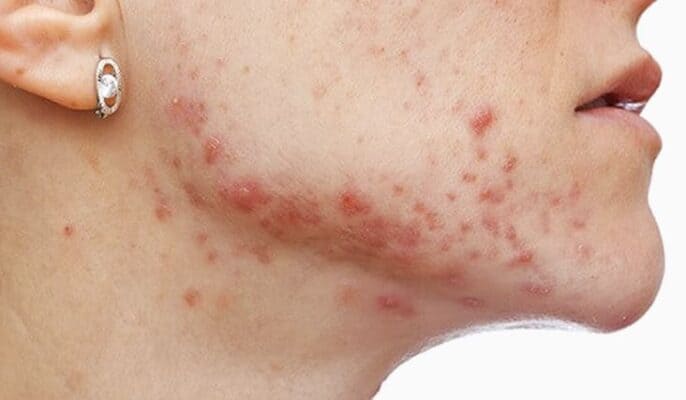
If you are suffering from fungal acne then you would be interested to know what is fungal acne. To begin with let’s establish what exactly is the problem of fungal acne. Fungi are microorganisms that thrive in a moist and warm environment. The body has several kinds of immune defenses which kill the foreign microorganisms but occasionally these barriers break down and allow fungi to survive and proliferate causing acne.
There are several risk factors that come into play when fungi colonize the skin. These include overuse of soap, constant washing with soap or other drying materials, genetics, environmental exposure, poor hygiene and skin problems like eczema and psoriasis. The fungi responsible for this kind of infection also have a genetic tendency to spread rapidly. Some of these infection types have symptoms like white spots that are flat on the surface of the skin, redness, thickening, irritation, pain, tenderness or swelling at the site of the infection, open sores or blisters, and feeling tired or fatigued.
These kinds of skin infections can be avoided if one takes the following precautionary measures. Clean the affected area twice a day. Washing it with soap and water can do the trick, but using an antifungal soap like Nizoral or Limacic will prevent the spread of ringworm. Clothing should also be washed. It is better to keep them clean and dry because the fungi growing on the infected area would like moisture to stay. When applying anti-fungal creams and ointments, make sure they have been approved by a medical authority.
There are over-the-counter medicines that can help control ringworm. These medicines come in various forms such as suppositories, powders and oral tablets. Some over-the-counter treatments for ringworm include Benzalkonium chloride, which is used to treat nail infections; Miconazole, which is used to treat skin infections; Butoconazole, which is used to treat hair loss; and Tioconazole, which is used to treat athlete’s foot fungus.

When it comes to choosing the best treatment for ringworm, there are some factors that must be taken into account. First of all, the disease is not a life-threatening disease, but it can cause extreme discomfort and embarrassment. So you need to take into consideration factors such as severity of your symptoms, the frequency of your outbreaks, amount of contact with others and location of your infection.
If your first choice of treatment does not work, you should consider getting a prescription from your doctor. The prescription may come in the form of an over the counter medication, or cream, lotion or shampoo. This will help you get rid of your ringworm problem quickly and efficiently. There are also prescription treatments available, that will help speed up the healing process. You should contact your doctor or pharmacist to discuss this for your personal situation.
When looking for a ringworm home cure, you will also want to pay close attention to your hygiene. For example, if you are using anti-fungal powder as a home remedy, you will need to clean the affected area thoroughly with soap and water, before applying the powder. Make sure that the area is completely dry before you apply the powder. This will help prevent a secondary infection.
Other ringworm home cures that are very effective include using tea tree oil and lavender oils. These oils have anti-fungal properties and can be applied to the skin on your hands or feet. You will want to soak the affected foot or hand in olive oil or petroleum jelly and then place a small dab of tea tree oil over the top of the area. Leave the solution on for about twenty minutes and then wash it off with warm water. Make sure to thoroughly dry the foot or hand with soap and water after each treatment.
A more extreme ringworm home cure is to actually cut the fungus out of the skin. This is a method used by some advanced podiatrists. To do this, the physician will make a small incision above the rash and pull the skin tight, then cut downward into the skin. The doctor may also use an electrosurgical needle to cut away the pus.
If neither of these ringworm home cure treatments works, or if your symptoms persist, it is time to consult a doctor. He can prescribe you with medications that are more effective and will get rid of the fungus that is causing your problems. Make sure that you follow all instructions carefully, and remember that prevention is the best cure. Get the right medication, and don’t scratch the ringworm itch.
